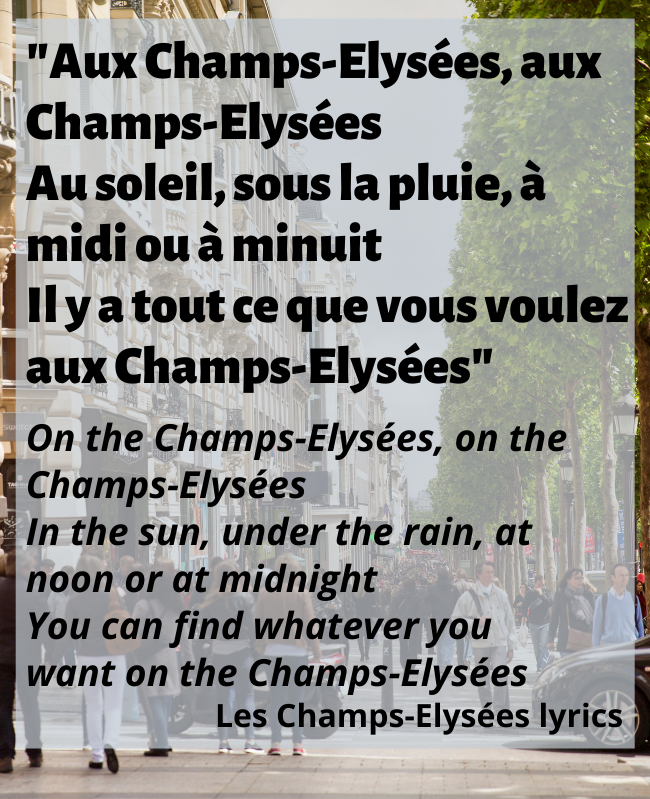“Les Champs Élysées” (pronounced le ʃɒ̃z eɪli zeɪ) is the greatest hit of French-American singer Joe Dassin (1938-1980). Released in 1969, the song and was a French adaption of Waterloo Road, a British song released the previous year by Jason Crest. The French version’s lyrics were written by Pierre Delanoë. Keep reading to discover the French lyrics with English translation, line-by-line lyrics analysis and listen on YouTube and Spotify.

Les Champs Élysées Song Background
Les Champs Élysées song lyrics recount the story of a man approaching a woman on the street. She invites him to spend the night singing and dancing in a bar. The two emerge the following day on to the street as lovers.
The Champs-Élysées is a major avenue in Paris running between Place de la Condorde and L’Arc de Triomphe. The avenue is known for its shopping, cafés and restaurants. The Champs-Élysées is also the site of the Bastille Day military parade and finish line of the Tour de France.
Note that the song title is “Les Champs Élysées” and not “Aux Champs Élysées“. People often confuse the title as the words “Aux Champs Élysées” (on the Champs-Élysées) are used in the song’s chorus.
Champs Elysées pronunciation
The words “Champs Elysées” are difficult to pronounce due to the nasal -am (covered on this pronunciation page). In addition, there is a liason (linking of two words) between the -s on champs and -e of elysées.
This page on Forvo offers several pronunciation samples of Champs Elysées by native speakers.

Listen to the song Les Champs-Elysées
Listen on YouTube
We’ve selected this YouTube video from frenchrescue as it offers simultaneous French lyrics with the English translations.
Listen on Spotify
If you have a subscription to Spotify, you can also listen to Les Champs-Elysées with the following:
Les Champs Elysées lyrics: grammatical analysis
The song lyrics are very easy to understand and don’t use any advanced grammar. In fact, they’d be excellent for students learning French at the upper-beginner or intermediate level.
Les Champs Elysées
Les is the plural form of “the”, which is the definite article in French. The -e with the upward slanting accent (-é) is pronounced “ay”. This accent is called l’accent aigu. This page covers French accent marks in detail.
Je m’baladais
This translates to “I was walking”. The verb is se balader, which means to take a walk or stroll. This is a reflexive verb. This line is written in the imperfect tense, which is the simple past (was _ing) in English.
J’avais envie de dire bonjour à n’importe qui
This line translates to “I wanted to say hello to anybody”. J’avais envie is the imperfect of j’ai envie, which means I want to or I fancy. N’importe qui means anybody. The word n’importe can be followed by question words to mean “any”. This page explains expression with n’importe.
Je t’ai dit n’importe quoi
This line translates literally to “I told you anything”. But, what it really means is “I said whatever to you”. This line is in the passé composé (French past tense) and the t’ is an object pronoun meaning “to you”. N’importe quoi in French means “nonsense” or “anything at all”.
Il suffisait de te parler, pour t’apprivoiser
This line translates literally to: “It was enough to speak to you to tame you“. Another site translates apprivoiser (translation: to tame) as get to know or become acquainted.
This verb is often used in the context of domesticating animals. We translated the line to “All I had to do was speak to you to win you over”.
Au soleil, sous la pluie, à midi ou à minuit
This line translates to “In the sun, under the rain, at noon or at midnight“. This page goes over weather terms and this page goes over telling time.
Il y a tout ce que vous voulez aux Champs-Elysées
We translated this line to: “You can find whatever you want on the Champs-Elysées“. The literal translation is: “There is what you want on the Champs-Elysées.
The expression il y a means there is or there are. Ce que is an indefinite relative pronoun, meaning what. “Vous voulez” is the vous form of vouloir, which means to want.
Tu m’as dit “J’ai rendez-vous dans un sous-sol avec des fous
We translated this line as: “You told me: “I have a meeting in a basement (bar) with some crazy people“. Tu m’as dit is the passé composé of the verb dire, which means to say.
The m’ means “to me“. The word rendez-vous can mean appointment or meeting.
The word sous-sol means basement. We translated it to mean bar as there are many bars on the Champs-Elysée. We translated “des fous” as some crazy people because “fou“ means crazy.
Alors je t’ai accompagnée, on a chanté, on a dansé
We translated this line to “So I went along with you, we sang, we danced“. Alors translates to both so and then. Accompagner mean to go with or accompany.
“On a chanté, on a dansé” translates to “we” sang and danced. On is a French personal pronoun that can be used to refer to us or “nous”. This page covers the personal pronoun on in detail.
Et l’on n’a même pas pensé à s’embrasser
This line translates to “And we didn’t even think of kissing each other“. The ne…pas is the most basic French negation rule.
The word même translates to both same and even. Hence, même pas means “not even”. The verb penser translates to “to think”. Translation of s’embrasser are to embrace and to kiss.
Deux amoureux tout étourdis par la longue nuit
This line translates to “Two lovers completely dazed by the long night“. Amoureux translates to lover or sweetheart. The word tout means all. However, in this context we’ve translated it as “completely”.
The French adjective étourdi has several translations. The most fitting meanings for the context of the song lyrics include dazed and giddy. Other translations include absent-minded and stunned.
Et de l’Étoile à la Concorde, un orchestre à mille cordes
This line translates to “The star at the Place de la Concorde, an orchestra playing a thousand strings“. L’Étoile à la Concorde refers to Place de la Concorde, where the Champs Elysées is located.
The line “un orchestre à mille cordes” (an orchestra playing a thousand strings) is meant to be a metaphor for the singing of the morning birds at dawn.
Tous les oiseaux du point du jour chantent l’amour
This line translates to “All the birds at dawn singing love“. Un oiseau means a bird. Tous les means “all the”. Le point du jour translates to dawn or daybreak. “Chatent” is the third-person plural (ils, elles) form of the verb chanter, which means to sing.

Les Champs Elysées lyrics: French and English translation
Lyrics by: Pierre Delanoë
Je m’baladais sur l’avenue le cœur ouvert à l’inconnu
J’avais envie de dire bonjour à n’importe qui
N’importe qui et ce fut toi, je t’ai dit n’importe quoi
Il suffisait de te parler, pour t’apprivoiser
I was walking on the avenue with my heart open to the stranger
I wanted to say hello to anybody, I said whatever to you
All I had to do was speak to you to win you over
Aux Champs-Elysées, aux Champs-Elysées
Au soleil, sous la pluie, à midi ou à minuit
Il y a tout ce que vous voulez aux Champs-Elysées
On the Champs-Elysées, on the Champs-Elysées
In the sun, under the rain, at noon or at midnight
You can find whatever you want on the Champs-Elysées
Tu m’as dit “J’ai rendez-vous dans un sous-sol avec des fous
Qui vivent la guitare à la main, du soir au matin”
Alors je t’ai accompagnée, on a chanté, on a dansé
Et l’on n’a même pas pensé à s’embrasser
You told me: “I have a meeting in a basement (bar) with some crazy people
Who live with a guitar in-hand from the evening until the morning”
So I went along with you, we sang, we danced
And we didn’t even think of kissing each other
Aux Champs-Elysées, aux Champs-Elysées
Au soleil, sous la pluie, à midi ou à minuit
Il y a tout ce que vous voulez aux Champs-Elysées
On the Champs-Elysées, on the Champs-Elysées
In the sun, under the rain, at noon or at midnight
You can find whatever you want on the Champs-Elysées
Hier soir, deux inconnus et ce matin sur l’avenue
Deux amoureux tout étourdis par la longue nuit
Last night, two strangers and this morning on the avenue
Two lovers completely dazed by the long night
Et de l’Étoile à la Concorde, un orchestre à mille cordes
Tous les oiseaux du point du jour chantent l’amour
The star at the Place de la Concorde, an orchestra playing a thousand strings
All the birds at dawn singing love
Aux Champs-Elysées, aux Champs-Elysées
Au soleil, sous la pluie, à midi ou à minuit
Il y a tout ce que vous voulez aux Champs-Elysées
On the Champs-Elysées, on the Champs-Elysées
In the sun, under the rain, at noon or at midnight
You can find whatever you want on the Champs-Elysées
Aux Champs-Elysées, aux Champs-Elysées
Au soleil, sous la pluie, à midi ou à minuit
Il y a tout ce que vous voulez aux Champs-Elysées
On the Champs-Elysées, on the Champs-Elysées
In the sun, under the rain, at noon or at midnight
You can find whatever you want on the Champs-Elysées
Conclusion
Félicitations! Congratulations! You now know the lyrics to Les Champs Élysées. Now check out some of our other song lyrics posts.
We’ve covered lots of popular classes such as La Vie en Rose lyrics, Non, Je Ne Regrette Rien (both by Edith Piaf), C’est Si Bon lyrics (by Yves Montand), Ne Me Quitte Pas (by Jacques Brel) and many more. Be sure to subscribe to French Learner to get a daily French lesson in your in box!
More French lessons by David Issokson

